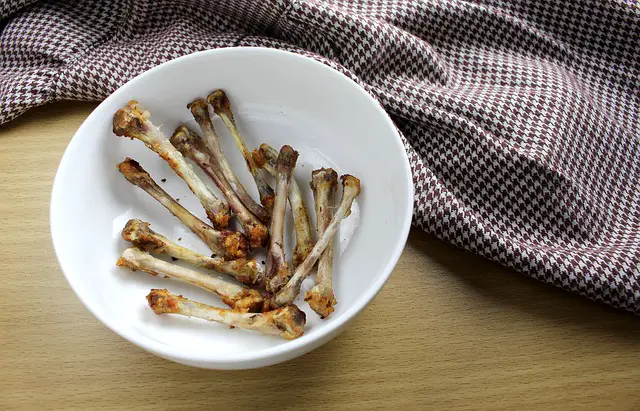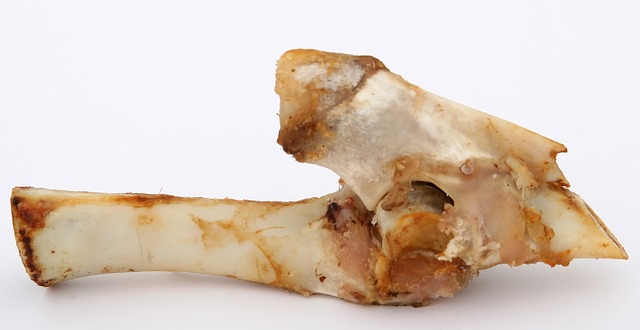
So, your dog ate chicken bones and you’re all worried and what not. It’s perfectly understandable. Any caring parent would be worried, and there is, indeed, some merit to your worry. There are actually a number of complications that can arise from a dog eating chicken bones.
Why Shouldn’t A Dog Eat Chicken Bones?
The problem with chicken bones is especially when it is cooked chicken bones. Although, generally, dogs do not have a problem digesting bones, they can, sometimes, encounter some physiological damage if they ingest cooked chicken bones.
- There’s the danger of internal blockage.
- Tearing of the esophagus and intestinal tract.
- Uncooked chicken bones have the risk of salmonella infection.
- Might also cause gut impaction.
- Could also cause constipation.
- There is also the risk of peritonitis (stomach infection).
It might sound a little funny that dogs whom we know to love and cherish bones should be in a precarious situation from eating chicken bones.
The truth is that dogs have no problems processing bones, including chicken bones, or more correctly, especially chicken bones. In fact, most times, chicken bones will dissolve the moment they come in contact with your dog’s highly acidic stomach. Before you know it, they pass out the bone without event in a matter of hours. Pork and beef bones, on the other hand, are much more difficult to process and might even cause disease.
That said, according to PetMD, there are still some potential hazards dogs who ingest chicken bones might face. Note that such cases are a rarity but they do happen anyway. Also, they mostly involve cooked chicken bones.
1. Potential Obstruction
In comparison to raw bones, cooked bones are understandably softer. However, some bones (like the thigh bone, for instance) can still be a bit large relative to the dog’s size. If in trying to swallow such bone, the bone fails to successfully go down, it could get stuck in the esophagus.
In such cases, this blockage can lead to drooling, gagging, and retching in the affected dog.
Other times, the bone might not get stuck in the esophagus but at the back of the throat or the pharynx. Such a case is considered an emergency as the dog begins to show symptoms such as trouble breathing and heavy coughing.
2. Tearing Of The Gastrointestinal Tract
Chicken bones tend to splinter quite easily. If swallowed, the dog risks the chicken bone tearing his esophagus and intestinal tract.
3. Bacterial Contamination
The risks for bacterial contamination become higher if said chicken bone is uncooked. Usually, the bacterial infection is caused by Salmonella.
4. Gut Impaction

If a dog has consumed a lot of bones, these bones might cluster together to form a ball that blocks the intestine. Consequences of such blockage are quite serious for a number of reasons.
In the first place, since food can no longer pass through, your dog begins to vomit. This vomiting, in turn, would lead to dehydration, but that’s not even the worst of it. The ball of clustered bones would, eventually, begin to release toxins which could lead to poisoning.
As you can see, this can be dangerous and potentially life-threatening for your dog. In most cases, your vet would have to carry out a surgical procedure to get the obstruction out before it causes irreversible damage.
5. Constipation
A lot of chicken bones consumed by a dog could also lead to constipation. In mild cases, an enema or laxative may bring relief. However, in extreme cases, your vet might have to physically break down the blockage before your dog can experience some relief. Don’t worry, the procedure requires anesthesia, so your dog won’t be upset much.
6. Peritonitis
Peritonitis is, in essence, an infection of the tummy. If shards from the chicken bone pierce the walls of the intestine, the content of the stomach might leak into the abdomen causing peritonitis. In such a case, surgery is the only way out, and even after that, there are no guarantees.
[amalinkspro type=”showcase” asin=”B01M0U75H3″ apilink=”https://www.amazon.com/dp/B01M0U75H3?tag=dpg-amalinks03-20&linkCode=osi&th=1&psc=1″ new-window=”true” addtocart=”true” nofollow=”true” sc-id=”4″ imgs=”LargeImage” link-imgs=”false” specs=”JUST ONE INGREDIENT – No hard to pronounce ingredients, or questionable sourcing~~~ALL NATURAL – No preservatives, no artificial flavoring, makes for a doggone good treat~~~LOCALLY SOURCED – Made only from grass-fed cattle born and raised in America~~~GFSI CERTIFIED – Produced with human grade food standards to ensure your fur-baby receives the best~~~SUBSCRIBE NOW FOR A CAUSE – Were rallying a Militia to rescue 10,000 K9s from euthanization by 2023~~~” btn-color=”#ff9900″ btn-text=”View on Amazon” alignment=”aligncenter” hide-prime=”0″ hide-image=”0″ hide-reviews=”0″ hide-price=”1″ hide-button=”0″ width=”750″]K9 Connoisseur Single Ingredient Dog Bones Made in USA Natural Marrow Filled Bone Chew Treats for Small to Medium Breed Aggressive Chewers Dogs Who Struggle with Boredom Best Up to 50 Pounds 6 Pack[/amalinkspro]
Can Dogs Eat Chicken Bones?
Cooked chicken bones are brittle and splinter very easily so they pose a serious hazard as they can tear the gut leading to peritonitis. Raw chicken bones, on the other hand, are less risky as they are still elastic and more supple than cooked chicken bones. They are also gentler on your dog’s gut and do not have the risk of splintering.
So, based on all these horror stories you’ve just read, you’re probably wondering if dogs should eat chicken bones at all. Well, the answer is yes and no.
Let’s start with no.
The answer is no if the chicken bone in question is cooked. Cooked chicken bones are more brittle and less elastic than their uncooked counterparts. So, they splinter far more easily when chewed which poses their greatest hazard.
These bone shards can do anything from tearing the gut to causing peritonitis.

On the other hand, raw bones are less risky than cooked bones as they are generally more supple and elastic.
Dogs only partially digest chicken bones and pass the waste out uneventfully in their stool. In fact, even though, on paper, raw chicken bones can cause damage, in reality, the chances are actually quite rare. Why?
For one, they are not as brittle as cooked bones, so there’s a lower risk of splintering. Raw bones are also gentler on the gut than cooked bones. Plus, if the bone contains some meat, the meat could cushion the hardness of the bone making it easier for your dog to digest.
In the video below, Greg Martinez (DVM) explains how chicken bones are safe for your dog as long as he chews them. He also explains that a raw chicken diet might be great for developing healthy teeth in your dog.
What Happens When Your Dog Eats Chicken Bones?
Watch out for the following signs in the 5 days following the day (you think) your dog ate chicken bones.
- Inappetence (loss of appetite).
- Retching.
- Restlessness.
- Lethargy.
- Diarrhea.
- Constipation.
- Fever.
- Coughing.
- Drooling.
A number of things could happen when a dog eats chicken bones – not all of them bad. So, if your dog just ate chicken bones, don’t panic yet. Simply wait and observe. Oftentimes, if there’s something wrong, signs and symptoms will develop between 24 and 120 hours.
If you notice any of the following signs, take your pup to the vet immediately.
What Do You Do If Your Dog Chokes On A Chicken Bone?
If you suspect that a chicken bone is stuck somewhere in the upper airway or in the upper intestinal tract of your dog, then consider it an emergency and treat as such.
First things first, open your dog’s mouth and try to see if you can see the bone or grasp it. If you can, take it out, but gently and carefully so you don’t hurt and distress your dog further. We’d advise you get someone else to do it if you’re too jittery yourself.
If, on the other hand, the bone is not visible, then pay your vet a visit immediately.
However, if there doesn’t seem to be choking, then simply observe and look out for the signs we mentioned in the last subheading. If he’s acting normal, then all is most likely well and there’s nothing to worry about.
Should I Induce Vomiting If My Dog Swallows A Chicken Bone?
You never induce vomiting in your dog whatever your dog might have swallowed and however potentially dangerous you think said substance might be. If you do and you don’t do it right (which is, most likely, what will happen) the bones might scrape and scratch your dog’s throat causing further problems. In a more unfortunate case, the bone might even get lodged at the back of your dog’s throat which only escalates the problem further. So, leave him be and call your vet if you’re so worried.
Alternatively, if your dog has scavenged a chicken bone (or any other bone) on an empty stomach, it might help to feed them some food. With food now surrounding the bone, the bone might successfully pass through the gut without issues.
Arden Moore, in this video, shares some tips and tricks to help you handle a dog that just ate chicken bones. She emphasizes the need to be calm and not yell at your dog as it might cause him to swallow more quickly. She also demonstrates the proper way to get the bone out of your dog’s mouth safely.
Check out these other helpful articles below:
- The Company of Animals Halti Head Collar — in-depth review .
- Hamilton Double Thick Nylon Dog Collar — full review.
- Blue Buffalo Natural Adult Weight Loss Dog Food — in-depth review.
- Blue Buffalo High Protein Grain Free Adult Dry Dog Food review.
- Petnation Port-A-Crate Dog Crate — in-depth review.
- Petco Classic Dog Crate — a complete review.
Raw Chicken Diet And Coonhound Paralysis In Dogs
Not to scare you but there’s something you might want to know about feeding your dog raw chicken if your dog is currently on a raw diet.
According to some research currently conducted by a group of scientists in Australia, feeding your dog raw chicken might be a risky move for dog parents.
From the findings of these researchers at the University of Melbourne Veterinary Teaching Hospital, Australia, there appears to be a link between a raw chicken diet and Coonhound Paralysis.
What Is Coonhound Paralysis?
Coonhound Paralysis is a rare paralytic dog disease also known as acute polyradiculoneuritis. This condition is characterized by damage to the muscles’ nerve supply. As a result, the affected dog becomes paralyzed and cannot move. He also develops some difficulty breathing as well.
Now, while this disease is indeed rare, what troubles the researches is that in 96% of the cases observed, dogs were kept on a raw diet. Furthermore, in all of those cases, all dogs ate raw chicken.
Nothing is concluded yet and research is still ongoing. However, from what the researchers know so far, there’s sufficient evidence to conclude that dogs on a raw chicken diet have higher chances of developing Coonhound paralysis.
There might not be reason to panic yet if your dog currently eats raw chicken as this condition is rare. Nonetheless, it won’t be a bad idea to be on the lookout anyway. Or alternatively, you might want to consider switching to a BARF dog diet instead. Click here to read our article on BARF Dog Food.
My Dog Ate Chicken Bones, What Do I Do? — Related FAQs
Can Chicken Bones Kill Dogs?
In extreme cases, chicken bones can kill dogs, especially if it’s cooked chicken bones.
Cooked bones splinter easily and can tear or puncture different parts of the gastrointestinal tract. This can then cause internal blockage, gut impaction, peritonitis, or, in extreme cases, even death.
Can A Dog’s Stomach Break Down Chicken Bones?
A dog’s stomach is highly acidic hence it is can digest chicken bones or any kind of bone for that matter.
Still, you should be careful about allowing your dog eat chicken bones because of the attending risks that come with dogs eating chicken bones.
How Long Does It Take A Dog To Digest A Bone?
Digestion in dogs is pretty fast. In fact, among mammals, dogs probably have the fastest digestion and it, generally, takes about 8 hours for them to digest food.
For dogs, though, it can take up to 24 hours to digest a bone for obvious reasons. You’ll know your dog has digested his bone when he passes out a white, dry, chalky stool.
What Bones Are Okay For Dogs?
Raw meat bones are completely safe for dogs. These include raw chicken, turkey, beef, and lamb bones.
Now, when giving your dog bones, make sure they are not unsupervised.
Also, retrieve the bones when your dog has chewed on them for about 10 to 15 minutes and refrigerate them. After three to four days, dispose of the bone completely to eliminate the risk of infection.
How Do You Tell If Your Dog Is Bleeding Internally?
Some common symptoms of internal bleeding in dogs include breathing difficulties, weakness, a distended abdomen, pale gums, and even collapsing.
There are also less common signs of internal bleeding in dogs which include general malaise, vomiting, and loss of appetite.
How Do I Know If My Dog Has A Bowel Obstruction?
Symptoms that your dog has a bowel obstruction include diarrhea, vomiting, straining while passing poop, bloating and pain in the abdomen, loss of appetite, burping, drooling, and lethargy.
